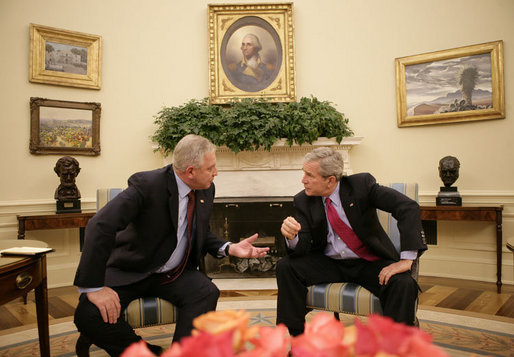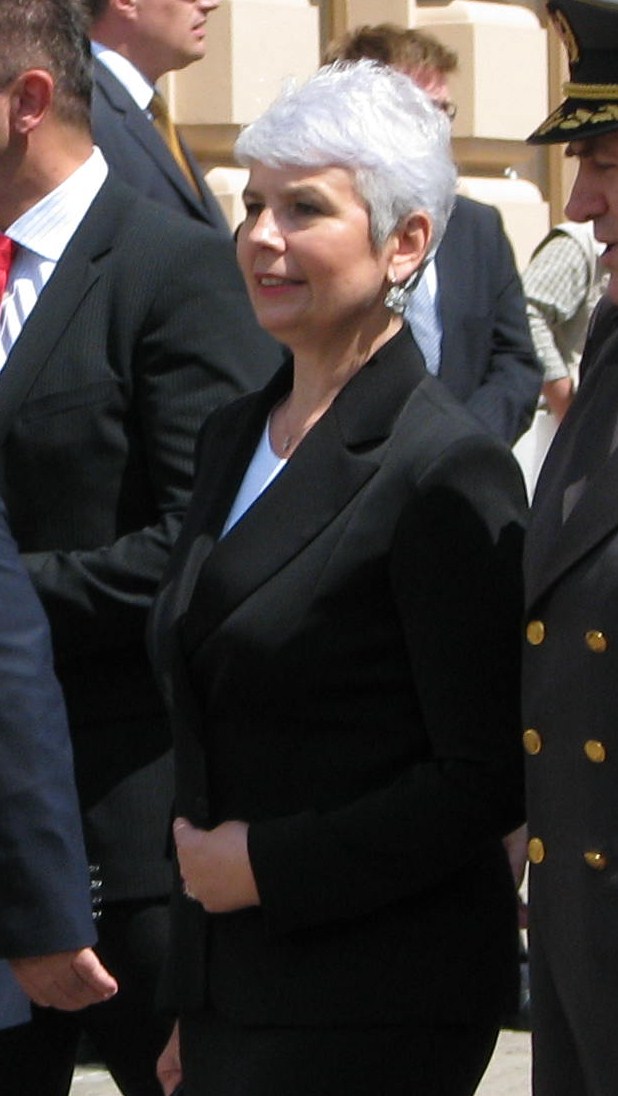|
Petar Čobanković
Petar Čobanković (29 January 1957) is a former Croatian politician who served as Minister of Regional Development, Forestry and Water Management. Čobanković finished elementary and high school in Ilok, after that he attended Faculty of Agriculture at University of Zagreb where he obtained his B.Sc. in agriculture. From 2000 until 2001 he was Prefect of Vukovar-Syrmia County. Between 2003 and 2008 he was the Minister of Agriculture, Forestry and Water Management in the Cabinet of Ivo Sanader I. On January 12, 2008 he was named Minister of Regional Development, Forestry and Water Management in the Cabinet of Ivo Sanader II. In 2010 he became deputy-prime minister of Government of Croatia in the Cabinet of Jadranka Kosor. Čobanković pleaded guilty and he was sentenced in March 2013 to one year in jail for corruption. The sentence was consequently reduced to a community sentence in an exchange for full cooperation with the prosecutor in the corruption case against the former ... [...More Info...] [...Related Items...] OR: [Wikipedia] [Google] [Baidu] |
Ivo Sanader
Ivo Sanader (born 8 June 1953) is a former Croatian politician who served as Prime Minister of Croatia from 2003 to 2009. He is to date the second longest-serving prime minister since independence, holding the office for over five and a half years before resigning in July 2009. He is one of only two Croatian prime ministers (along with Andrej Plenković) who have served more than one term, winning general elections in 2003 Croatian parliamentary election, 2003 and 2007 Croatian parliamentary election, 2007. He is also, along with Ivica Račan and Plenković, one of the three prime ministers who have been at the head of more than one government cabinet, chairing his Cabinet of Ivo Sanader I, first cabinet from 23 December 2003 until 12 January 2008, and his Cabinet of Ivo Sanader II, second cabinet from 12 January 2008 until his resignation on 6 July 2009. Sanader obtained his education in comparative literature in Austria, where he also worked as a journalist, in marketing, publi ... [...More Info...] [...Related Items...] OR: [Wikipedia] [Google] [Baidu] |
Cabinet Of Ivo Sanader I
The Ninth Government of the Republic of Croatia ( hr, Deveta Vlada Republike Hrvatske) was the first of two Croatian Government cabinets led by Prime Minister of Croatia, Prime Minister Ivo Sanader. It was announced on 23 December 2003 and its term ended on 12 January 2008. All but two cabinet members came from the ruling Croatian Democratic Union (HDZ) party, following their win in the Croatian parliamentary election, 2003, 2003 parliamentary elections (with the exception of Dragan Primorac, who was formally a non-party minister at the time of his appointment, but later joined HDZ and Vesna Škare-Ožbolt who had been a member of HDZ in the 1990s but then joined the Democratic Centre (Croatia), Democratic Centre, a small centre-right party which allied with HDZ after the 2003 elections). Motions of confidence Party breakdown Party breakdown of cabinet ministers (12 January 2008): Changes from Cabinet of Ivica Račan II Since Račan's centre-left coalition was replaced by th ... [...More Info...] [...Related Items...] OR: [Wikipedia] [Google] [Baidu] |
Croatian Democratic Union Politicians
Croatian may refer to: *Croatia *Croatian language *Croatian people *Croatians (demonym) See also * * * Croatan (other) * Croatia (other) * Croatoan (other) * Hrvatski (other) * Hrvatsko (other) * Serbo-Croatian (other) Serbo-Croatian or Croato-Serbian, rarely Serbo-Croat or Croato-Serb, refers to a South Slavic language that is the primary language of Serbia, Croatia, Bosnia and Herzegovina, and Montenegro. Serbo-Croatian, Serbo-Croat, Croato-Serbian, Croato-Serb ... {{disambiguation Language and nationality disambiguation pages ... [...More Info...] [...Related Items...] OR: [Wikipedia] [Google] [Baidu] |
People From Ilok
A person ( : people) is a being that has certain capacities or attributes such as reason, morality, consciousness or self-consciousness, and being a part of a culturally established form of social relations such as kinship, ownership of property, or legal responsibility. The defining features of personhood and, consequently, what makes a person count as a person, differ widely among cultures and contexts. In addition to the question of personhood, of what makes a being count as a person to begin with, there are further questions about personal identity and self: both about what makes any particular person that particular person instead of another, and about what makes a person at one time the same person as they were or will be at another time despite any intervening changes. The plural form "people" is often used to refer to an entire nation or ethnic group (as in "a people"), and this was the original meaning of the word; it subsequently acquired its use as a plural form of per ... [...More Info...] [...Related Items...] OR: [Wikipedia] [Google] [Baidu] |
Living People
Related categories * :Year of birth missing (living people) / :Year of birth unknown * :Date of birth missing (living people) / :Date of birth unknown * :Place of birth missing (living people) / :Place of birth unknown * :Year of death missing / :Year of death unknown * :Date of death missing / :Date of death unknown * :Place of death missing / :Place of death unknown * :Missing middle or first names See also * :Dead people * :Template:L, which generates this category or death years, and birth year and sort keys. : {{DEFAULTSORT:Living people 21st-century people People by status ... [...More Info...] [...Related Items...] OR: [Wikipedia] [Google] [Baidu] |
1957 Births
1957 ( MCMLVII) was a common year starting on Tuesday of the Gregorian calendar, the 1957th year of the Common Era (CE) and ''Anno Domini'' (AD) designations, the 957th year of the 2nd millennium, the 57th year of the 20th century, and the 8th year of the 1950s decade. Events January * January 1 – The Saarland joins West Germany. * January 3 – Hamilton Watch Company introduces the first electric watch. * January 5 – South African player Russell Endean becomes the first batsman to be dismissed for having ''handled the ball'', in Test cricket. * January 9 – British Prime Minister Anthony Eden resigns. * January 10 – Harold Macmillan becomes Prime Minister of the United Kingdom. * January 11 – The African Convention is founded in Dakar. * January 14 – Kripalu Maharaj is named fifth Jagadguru (world teacher), after giving seven days of speeches before 500 Hindu scholars. * January 15 – The film ''Throne of Blood'', Akira Kurosawa's reworking of '' Ma ... [...More Info...] [...Related Items...] OR: [Wikipedia] [Google] [Baidu] |
Cabinet Of Jadranka Kosor
The Eleventh Government of the Republic of Croatia ( hr, Jedanaesta Vlada Republike Hrvatske) was the Croatian Government cabinet led by Prime Minister Jadranka Kosor. It was announced on 6 July 2009 and its term ended on 23 December 2011. The cabinet came into existence after Prime Minister Ivo Sanader abruptly resigned on 1 July 2009, designating Kosor as his successor and making her the first woman to serve as Prime Minister since Croatia gained independence in 1991. It was succeeded by the Cabinet of Zoran Milanović following the centre-left Kukuriku coalition's success in the 2011 parliamentary elections. The cabinet represented parties from the ruling coalition formed following the 2007 parliamentary elections: *Croatian Democratic Union (HDZ) *Croatian Social Liberal Party (HSLS) *Independent Democratic Serb Party (SDSS) *Croatian Peasant Party (HSS) Motions of confidence Party breakdown Party breakdown of cabinet ministers (23 December 2011): Changes from th ... [...More Info...] [...Related Items...] OR: [Wikipedia] [Google] [Baidu] |
Government Of Croatia
The Government of Croatia ( hr, Vlada Hrvatske), formally the Government of the Republic of Croatia ( hr, Vlada Republike Hrvatske), commonly abbreviated to Croatian Government ( hr, hrvatska Vlada), is the main executive branch of government in Croatia. It is led by the president of the Government ( hr, predsjednik Vlade), informally abbreviated to premier ( hr, premijer) or prime minister. The prime minister is nominated by the president of the Republic from among those candidates who enjoy majority support in the Croatian Parliament; the candidate is then chosen by the Parliament. There are 20 other government members, serving as deputy prime ministers, government ministers or both; they are chosen by the prime minister and confirmed by the Parliament (Sabor). The Government of the Republic of Croatia exercises its executive powers in conformity with the Croatian Constitution and legislation enacted by the Croatian Parliament. The current government is led by Prime Mini ... [...More Info...] [...Related Items...] OR: [Wikipedia] [Google] [Baidu] |
Cabinet Of Ivo Sanader II
The Tenth Government of the Republic of Croatia ( hr, Deseta Vlada Republike Hrvatske) was the second of two Croatian Government cabinets led by Prime Minister Ivo Sanader. It was announced on 12 January 2008 and its term ended on 6 July 2009, when Jadranka Kosor formed the 11th cabinet following Sanader's surprise resignation. Cabinet members represented parties of the ruling coalition which was formed following the 2007 parliamentary elections: *Croatian Democratic Union (HDZ) *Croatian Social Liberal Party (HSLS) *Independent Democratic Serb Party (SDSS) *Croatian Peasant Party (HSS) It was the first Croatian cabinet since the first multi-party elections in 1990 to have a party representing the Serb minority in Croatia ( SDSS) as its member, with Slobodan Uzelac holding office as of one of the Deputy Prime Ministers. This was mainly due to the fact that this cabinet was heavily dependent on the support of the 8 national minority representatives in the Croatian Parliament, so ... [...More Info...] [...Related Items...] OR: [Wikipedia] [Google] [Baidu] |
Vukovar-Syrmia County
Vukovar-Srijem County ( hr, Vukovarsko-srijemska županija), Vukovar-Sirmium County or Vukovar-Syrmia County, named after the eponymous town of Vukovar and the region of Syrmia, is the easternmost Croatian county. It includes the eastern parts of the region of Slavonia and the western parts of the region of Syrmia, as well as the lower Sava river basin, Posavina and Danube river basin Podunavlje. Due to the overlapping definitions of geographic regions, division on Slavonia and Syrmia approximately divides the county vertically into north-west and south-east half, while division on Posavina and Podunavlje divides it horizontally on north-east and south-west half. The county's seat is in Vukovar, a town on the Danube river while its biggest town and economic and transportation center is in Vinkovci, town with 33,328 inhabitants. Vinkovci served as an temporary ''de facto'' seat of the county during the Croatian War of Independence with some institutions still remaining in the town ... [...More Info...] [...Related Items...] OR: [Wikipedia] [Google] [Baidu] |
Jadranka Kosor
Jadranka Kosor (; born 1 July 1953) is a Croatian politician and former journalist who served as Prime Minister of Croatia from 2009 to 2011, having taken office following the sudden resignation of her predecessor Ivo Sanader. Kosor was the first and so far only woman to become Prime Minister of Croatia since independence. Kosor started working as a journalist, following her graduation from the Zagreb Faculty of Law. During the Croatian War of Independence, she hosted a radio show dealing with refugee problems and disabled war veterans. She joined the centre-right Croatian Democratic Union (HDZ) in 1989 and quickly climbed up the party hierarchy. In 1995 she was elected party vice-president and was elected to serve in Parliament for the first time. After the death of president and longtime HDZ leader Franjo Tuđman, Kosor supported Ivo Sanader's successful party leadership bid in 2000. Three years later, her party won the parliamentary election and Kosor became the Minister of ... [...More Info...] [...Related Items...] OR: [Wikipedia] [Google] [Baidu] |

_1938.jpg)

.jpg)
.jpg)